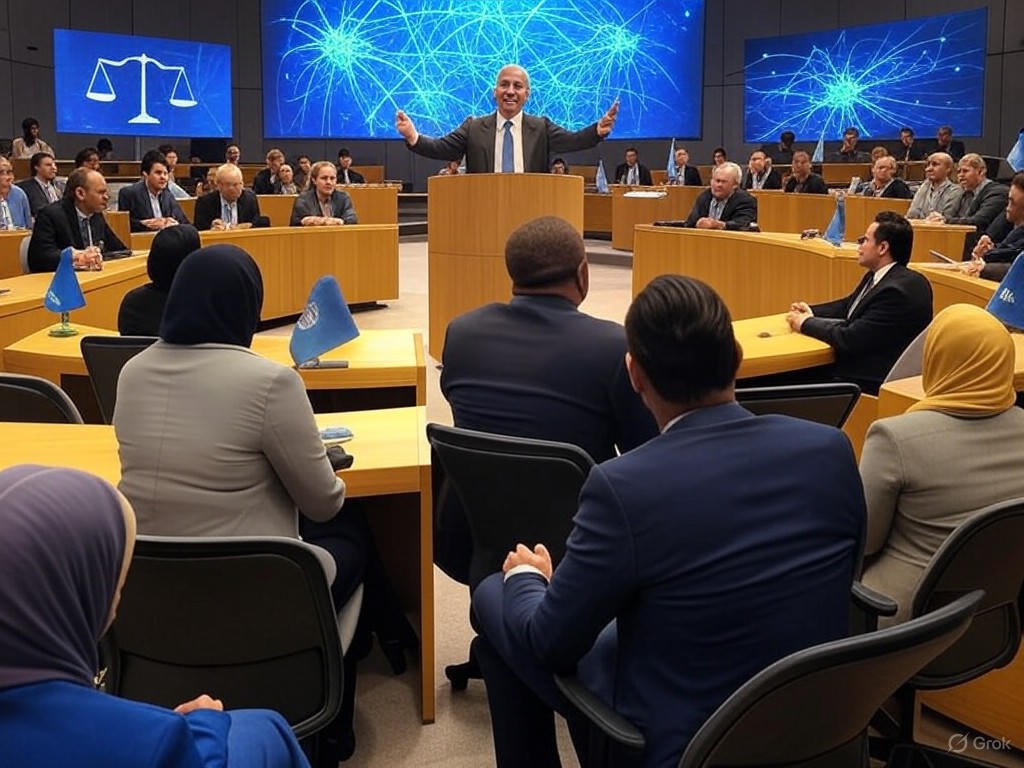Global AI Ethics: UN’s Push for Regulation
In an era where artificial intelligence churns out everything from personalized recommendations to life-saving medical diagnoses, the global stage is set for a classic tug-of-war. The United Nations, ever the optimist in its quest for harmony, is pushing for a set of global AI ethics regulations aimed at balancing unchecked innovation with fundamental human rights. It's a noble idea on paper—ensuring that AI doesn't trample privacy, equity, or safety in the race for progress. Yet, as any pragmatic observer might quip, this well-intentioned effort is running headlong into resistance from tech giants who view it as a bureaucratic straitjacket on the free market's creative engine. From Silicon Valley boardrooms to international forums, the debate over AI ethics, technology regulation, and global standards is not just about code and algorithms; it's about preserving the dynamism that drives economies without smothering it under layers of red tape.
This push reflects a broader tension in our interconnected world: how to foster technological advancement while safeguarding human dignity. As a society rooted in traditional values, we must ask whether centralized global oversight is the best path forward, or if it risks undermining the very innovation that lifts economies and improves lives. Let's unpack this with a clear-eyed look at the stakes.
The UN's Vision: A Framework for Global AI Ethics
The United Nations' initiative, spearheaded through bodies like UNESCO and the AI for Good program, seeks to establish universal guidelines for AI ethics that prioritize human rights, transparency, and accountability. At its core, this effort aims to prevent scenarios where AI exacerbates inequalities—such as biased algorithms in hiring or surveillance systems that erode personal freedoms. Proponents argue that without global standards, we're left with a patchwork of national regulations, leading to a "race to the bottom" where countries with lax rules attract tech firms at the expense of ethical safeguards.
Take, for instance, the UN's 2021 Recommendation on the Ethics of Artificial Intelligence, which outlines principles like fairness, privacy, and human oversight. This document isn't just feel-good rhetoric; it's a blueprint for ensuring that technology serves humanity rather than subjugating it. Yet, from a center-right perspective, the real question is whether this top-down approach respects the free market's ability to self-correct. After all, innovation thrives on competition, not mandates. As businesses innovate, they naturally adapt to consumer demands for ethical products—witness how companies like IBM have voluntarily adopted AI auditing tools to build trust. Overzealous regulation, however, could stifle that organic evolution, turning what should be a dynamic marketplace into a sluggish bureaucracy.

Delegates at a UN forum passionately debating AI ethics standards, highlighting the global divide between regulatory advocates and industry skeptics.
Analyzing the Resistance: Tech Giants and the Free Market Imperative
The resistance from tech behemoths like Google, Microsoft, and Amazon isn't mere corporate petulance; it's a defense of the free enterprise system that has fueled unprecedented economic growth. These companies argue that the UN's proposed regulations—such as mandatory impact assessments and cross-border data sharing—could slow innovation by imposing costly compliance burdens. In a global economy where AI is projected to add $15.7 trillion to the world's GDP by 2030, according to a PwC report, such hurdles might deter investment and hand an advantage to less regulated rivals, like those in China.
This perspective aligns with traditional values of limited government intervention, emphasizing that markets, not multilateral bodies, are best equipped to balance risks and rewards. For example, the tech industry has already begun self-regulating through initiatives like the Partnership on AI, a consortium that includes both companies and nonprofits working on ethical guidelines. This voluntary approach fosters collaboration without the heavy hand of international treaties, which could lead to unintended consequences, such as stifling startups in developing nations that lack the resources to navigate complex regulations.
Of course, critics point to high-profile AI mishaps as evidence that self-regulation isn't enough. Cases like facial recognition software exhibiting racial biases have sparked public outcry, underscoring the need for some oversight Wall Street Journal on AI Bias. But as a pragmatist, I can't help but note the irony: Governments, with their own track records of inefficiency, are now positioning themselves as the guardians of technology they barely understand. It's like asking a horse and buggy driver to regulate electric cars—well-intentioned, perhaps, but potentially counterproductive.
Evidence from the Front Lines: Weighing Innovation Against Human Rights
To appreciate the full picture, let's examine the evidence. Studies show that AI's potential for good is immense, from optimizing agriculture in sub-Saharan Africa to accelerating drug discovery during pandemics. Yet, without guardrails, it could widen social divides. A report from the IEEE on Global AI Ethics highlights how unregulated AI could exacerbate income inequality, as automation displaces jobs faster than new ones are created. Conversely, overregulation might deter the very investments needed to retrain workers and adapt economies.
Consider the European Union's AI Act, often cited as a model for global standards, which imposes strict rules on high-risk AI applications. While it aims to protect human rights, early analyses suggest it could raise compliance costs by up to 20% for firms, potentially slowing Europe's tech sector TechCrunch on EU AI Regulations. This isn't just theoretical; in the U.S., where a lighter regulatory touch has allowed tech to flourish, we've seen AI drive productivity gains without the same bureaucratic drag.
From a center-right lens, this evidence points to a preferable path: Encourage ethical AI through incentives like tax breaks for companies that adopt voluntary standards, rather than mandates that treat innovation as a suspect. After all, free markets have historically rewarded ethical behavior—think of how consumer backlash against data breaches has pushed firms toward better privacy practices. As The Brookings Institution on AI Governance notes, fostering public-private partnerships could achieve ethical goals without undermining economic freedom.

Engineers in a bustling AI lab prototype ethical algorithms, symbolizing the tension between corporate innovation and global regulatory pressures.
A Pragmatic Path Forward: Preserving Balance in the AI Age
In conclusion, the UN's push for global AI ethics regulations represents a well-meaning attempt to harmonize technology with human rights, but it must be tempered with the realities of free markets and limited government. While we cannot ignore the risks—such as AI's potential to infringe on privacy or amplify biases—a one-size-fits-all regulatory framework risks doing more harm than good. Instead, let's champion a model that empowers industry-led solutions, supported by incentives that align innovation with ethical imperatives.
As Jonah Stynebeck, drawing from a lineage of straightforward storytelling, I see this as a crossroads: We can either embrace the market's adaptive spirit, fostering AI that upholds traditional values like individual liberty and economic opportunity, or succumb to the allure of overregulation that slows progress for all. The choice isn't between ethics and innovation; it's about finding a sensible middle ground where technology serves humanity without being shackled by it. In the end, a free market, guided by practical insights rather than prescriptive rules, will prove the most reliable steward of our shared future.

